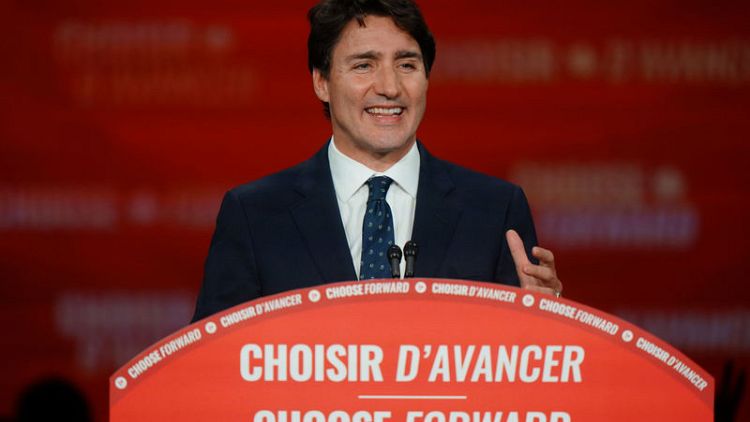By David Ljunggren
OTTAWA (Reuters) - Canadian Prime Minister Justin Trudeau hung onto power after a tight election on Monday that saw his government reduced to a minority, results that will likely push his agenda to the left while alienating energy producing provinces.
Trudeau, one of the world's most prominent progressive politicians, struggled with domestic scandals. He now looks set to govern with support from the left-leaning New Democrats, who have 24 seats.
His Liberals did not win any seats in the oil-rich provinces of Alberta and Saskatchewan. The party was leading or elected in 157 seats, a decrease of 20, preliminary results showed.
Minority governments in Canada rarely last more than 2-1/2 years. Although the New Democrats lost 16 seats, leader Jagmeet Singh is positioned to press for action on priorities such as more social spending and increased action on climate change.
One senior Liberal noted that many legislators need to serve another two years to meet the six-year requirement for a Parliamentary pension.
"That gives us a pretty free hand for that period," said the Liberal, who requested anonymity given the sensitivity of the matter.
The New Democrats struck deals to help keep Liberal minority governments in power from 1972-1974 and in 2005.[L2N277069]
Together the two parties can muster a majority 180 seats in the 338-seat House of Commons.
The election was a disappointment for Conservative leader Andrew Scheer, whose party gained seats but not the majority it had sought.
The Canadian dollar weakened against the greenback on Tuesday and the heavily-weighted energy sector fell on the Toronto stock market, as investors worried that a minority government would make it more difficult to build new oil pipelines.
Trudeau visited Montreal's subway, posing for selfies with commuters early on Tuesday, an echo of 2015 when he did the same thing.
This win was different. But Trudeau barely mentioned the loss of his majority when he spoke to supporters early on Tuesday, saying he had "a clear mandate" for a progressive agenda and more action to combat global warming.
This is unlikely to please the western provinces of Alberta and Saskatchewan, which cast out every Liberal legislator amid anger over what the energy industry sees as overly stringent environmental rules.
Canada's oil sands, home to the world's third-largest crude reserves, lie entirely within Alberta. The energy sector accounts for 11% of Canadian GDP.
"This truly is the worst possible outcome," said Tim Pickering, chief executive of Auspice Capital Advisers, which manages a Canadian crude oil exchange-traded fund. "We have got a Liberal minority and the balance of power shifts to the NDP and the Greens, who are completely opposed to any progressive energy policies."
The most prominent victim in the Liberals' western losses was Public Safety Minister Ralph Goodale, one of Trudeau's top cabinet members.
Trudeau's liberal image took a blow early in the campaign when photos emerged of him wearing blackface in the early 1990s and in 2001.
He had already been wrestling with fallout from accusations he pressured former Justice Minister Jody Wilson-Raybould to help shield engineering firm SNC-Lavalin Group Inc <SNC.TO> from corruption charges. In August, a top watchdog said he had breached ethics rules.
Wilson-Raybould, now an independent member of parliament, retained her seat on Monday, a feat in a country where nearly all legislators are backed by major parties. Former minister Jane Philpott, who also quit the cabinet over the affair and ran as an independent, lost her Ontario riding.
Preliminary results gave the Liberals 33.1% of the popular vote, below the opposition Conservatives' 34.4%.
With nearly all votes counted on Tuesday morning Scheer's Conservatives were leading or elected in 121 ridings, up only 24 seats.
Scheer said he would continue to lead the party, but the result looks set to reopen questions about his future. Even before the election, some in the party were speculating about a leadership challenge if he lost.
(Additional reporting by Nia Williams in Calgary; Editing by David Gregorio)
